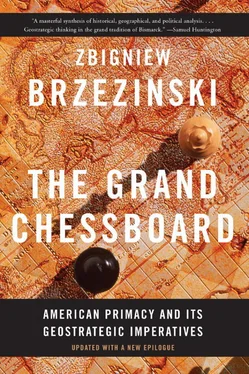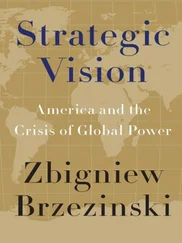The answer depends in part on how long that primacy lasts and on how energetically America shapes a framework of key power partnerships that over time can be more formally institutionalized. In fact, the window of historical opportunity for America’s constructive exploitation of its global power could prove to be relatively brief, for both domestic and external reasons. A genuinely populist democracy has never before attained international supremacy. The pursuit of power and especially the economic costs and human sacrifice that the exercise of such power often requires are not generally congenial to democratic instincts. Democratization is inimical to imperial mobilization.
Indeed, the critical uncertainty regarding the future may well be whether America might become the first superpower unable or unwilling to wield its power. Might it become an impotent global power? Public opinion polls suggest that only a small minority (13 percent) of Americans favor the proposition that “as the sole remaining superpower, the U.S. should continue to be the preeminent world leader in solving international problems.” An overwhelming majority (74 percent) prefer that America “do its fair share in efforts to solve international problems together with other countries.” [3]
Moreover, as America becomes an increasingly multicultural society, it may find it more difficult to fashion a consensus on foreign policy issues, except in the circumstances of a truly massive and widely perceived direct external threat. Such a consensus generally existed throughout World War II and even during the Cold War. It was rooted, however, not only in deeply shared democratic values, which the public sensed were being threatened, but also in a cultural and ethnic affinity for the predominantly European victims of hostile totalitarianisms.
In the absence of a comparable external challenge, American society may find it much more difficult to reach agreement regarding foreign policies that cannot be directly related to central beliefs and widely shared cultural-ethnic sympathies and that still require an enduring and sometimes costly imperial engagement. If anything, two extremely varying views on the implications of America’s historic victory in the Cold War are likely to be politically more appealing: on the one hand, the view that the end of the Cold War justifies a significant reduction in America’s global engagement, irrespective of the consequences for America’s global standing; and on the other, the perception that the time has come for genuine international multilateralism, to which America should even yield some of its sovereignty. Both extremes command the loyalty of committed constituencies.
More generally, cultural change in America may also be uncongenial to the sustained exercise abroad of genuinely imperial power. That exercise requires a high degree of doctrinal motivation, intellectual commitment, and patriotic gratification. Yet the dominant culture of the country has become increasingly fixated on mass entertainment that has been heavily dominated by personally hedonistic and socially escapist themes. The cumulative effect has made it increasingly difficult to mobilize the needed political consensus on behalf of sustained, and also occasionally costly, American leadership abroad. Mass communications have been playing a particularly important role in that regard, generating a strong revulsion against any selective use of force that entails even low levels of casualties.
In addition, both America and Western Europe have been finding it difficult to cope with the cultural consequences of social hedonism and the dramatic decline in the centrality of religious-based values in society. (The parallels with the decline of the imperial systems summarized in chapter 1 are striking in that respect.) The resulting cultural crisis has been compounded by the spread of drugs and, especially in America, by its linkage to the racial issue. Lastly, the rate of economic growth is no longer able to keep up with growing material expectations, with the latter stimulated by a culture that places a premium on consumption. It is no exaggeration to state that a sense of historical anxiety, perhaps even of pessimism, is becoming palpable in the more articulate sectors of Western society.
Almost half a century ago, a noted historian, Hans Kohn, having observed the tragic experience of the two world wars and the debilitating consequences of the totalitarian challenge, worried that the West may have become “fatigued and exhausted.” Indeed, he feared that
[t]wentieth century man has become less confident than his nineteenth century ancestor was. He has witnessed the dark powers of history in his own experience. Things which seemed to belong to the past have reappeared: fanatical faith, infallible leaders, slavery and massacres, the uprooting of whole populations, ruthlessness and barbarism. [4]
That lack of confidence has been intensified by widespread disappointment with the consequences of the end of the Cold War. Instead of a “new world order” based on consensus and harmony, “things which seemed to belong to the past” have all of a sudden become the future. Although ethnic-national conflicts may no longer pose the risk of a central war, they do threaten the peace in significant parts of the globe. Thus, war is not likely to become obsolete for some time to come. With the more-endowed nations constrained by their own higher technological capacity for self-destruction as well as by self-interest, war may have become a luxury that only the poor peoples of this world can afford. In the foreseeable future, the impoverished two-thirds of humanity may not be motivated by the restraint of the privileged.
It is also noteworthy that international conflicts and acts of terrorism have so far been remarkably devoid of any use of the weapons of mass destruction. How long that self-restraint may hold is inherently unpredictable, but the increasing availability, not only to states but also to organized groups, of the means to inflict massive casualties—by the use of nuclear or bacteriological weapons—also inevitably increases the probability of their employment.
In brief, America as the world’s premier power does face a narrow window of historical opportunity. The present moment of relative global peace may be short lived. This prospect underlines the urgent need for an American engagement in the world that is deliberately focused on the enhancement of international geopolitical stability and that is capable of reviving in the West a sense of historical optimism. That optimism requires the demonstrated capacity to deal simultaneously with internal social and external geopolitical challenges.
However, the rekindling of Western optimism and the universalism of the West’s values are not exclusively dependent on America and Europe. Japan and India demonstrate that the notions of human rights and the centrality of the democratic experiment can be valid in Asian settings as well, both in highly developed ones and in those that are still only developing. The continued democratic success of Japan and India is, therefore, also of enormous importance in sustaining a more confident perspective regarding the future political shape of the globe. Indeed, their experience, as well as that of South Korea and Taiwan, suggests that China’s continued economic growth, coupled with pressures from outside for change generated by greater international inclusion, might perhaps also lead to the progressive democratization of the Chinese system.
Meeting these challenges is America’s burden as well as its unique responsibility. Given the reality of American democracy, an effective response will require generating a public understanding of the continuing importance of American power in shaping a widening framework of stable geopolitical cooperation, one that simultaneously averts global anarchy and successfully defers the emergence of a new power challenge. These two goals—averting global anarchy and impeding the emergence of a power rival—are inseparable from the longer-range definition of the purpose of America’s global engagement, namely, that of forging an enduring framework of global geopolitical cooperation.
Читать дальше












